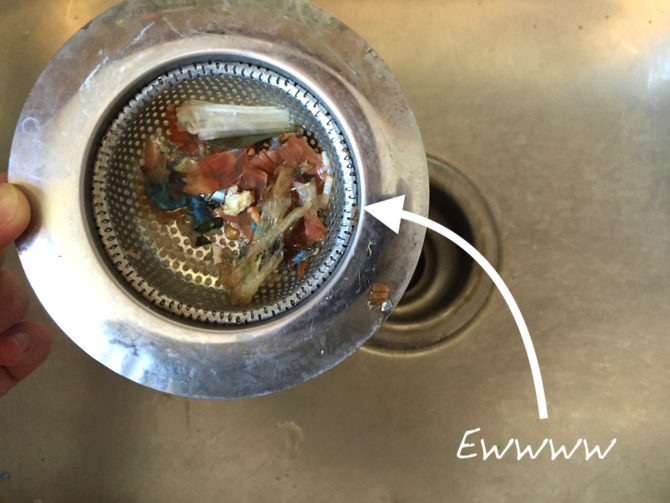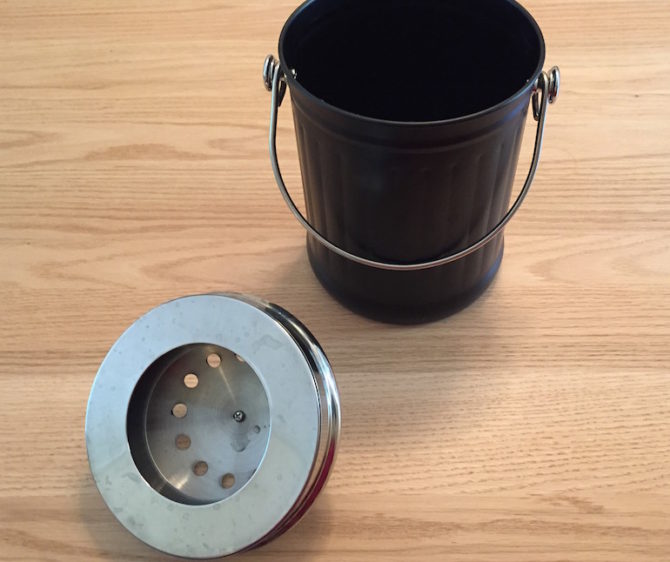This is a story about how staring down my food waste helped me to generate less of it. Before we get to that though, let’s take a quick journey back in time.

GIF courtesy of giphy.com
When I was in sixth grade, I had a fantastic science teacher who took took our class on a great field trip… to the local landfill.
From our bus, we could see trucks adding trash to what could only be described as a mountain. It was an ugly and thought-provoking site (not to mention a thought-provoking smell), and it still comes to mind every time I shame a new family member or friend into being a better recycler. For me, the connection between my trashcan at home and Mt. Trash was very clear, and I never wanted to contribute more to the site if I could avoid it.
At the same time though, I never made the same connection between my sink and… well, I didn’t know where.
On a daily basis, I would scrape my plate clean by sending food bits down our garbage disposal and waving them a final goodbye as they traveled out of sight and out of mind. As far as I cared to believe, the food scraps I threw down the sink ended up in some imaginary scene from Flushed Away while I continued on blissfully with my day.

GIF courtesy of giphy.com
And then one day, not too long ago, everything changed.
This past August, I made the jump from living on my college campus to renting an off-campus apartment, and I was faced with a new set-up: there was no garbage disposal in our kitchen.
If you want to avoid clogged sinks and plumbing disasters in the absence of a garbage disposal, the only way to deal with food scraps is by using a quaint little drain strainer and bravely diving your hand in the sink every once in a while to clean it out.

Photo by Mollie Simon
Goes without saying, but that was not my favorite task.
Within a few weeks of life as an avid kitchen user without a garbage disposal (or a garburator, as it is called in Canada), I started to notice just how much I was scooping from the sink to the trash.
There were banana peels and eggs shells, scraps of dough and broccoli stems, seeds and just unidentified, yucky food remnants. And the list goes on.
I soon realized that with a garbage disposal, your food waste doesn’t ever visually add up. You send food scraps down the drain, never to see them again. There is no tally on how much has made the journey down your sink or what that pile of waste really looks like.
With a trash can though, you see that banana peel hanging out a few days in a row and can smell the bag begging to begin its next chapter in the dumpster.
After a little research, I learned that while the trash can was making me realize the piles of trash I throw away, it is probably the worst path for food odds and ends – even worse than the sink.
Food waste represents the second largest category of landfill waste in the United States, weighing in at 30 million tons annually, according to the Environmental Protection Agency. What makes this dangerous is that food waste breaks down to form methane, which is worse for climate change than even carbon dioxide emissions.
While food sent down a garbage disposal isn’t disappearing, it does have a slightly better path for the environment as water is filtered out and solid waste may be turned into biogas or fertilizer.
The jury is definitely still out on whether garbage disposals can be considered “green,” as the biggest garbage disposal maker, InSinkErator, claims. What is clear though, is that it is better to just find ways to throw away less in the first place.
Instead of worrying about the merits of sink vs. trash waste, I was fortunate enough to be able to make another shift: I started composting with the help of an awesome countertop bin from my roommate. Unlike throwing stuff away and seeing it pile on in your trashcan or letting things float out of sight and out of mind, composting proved far more mindful for me.

Photo by Mollie Simon
Not only does this baby keep our kitchen from stinking or our trash bag from needing to be replaced every other day, but it still gives us a friendly reminder of our food waste. Granted, you can’t put everything into the bin, and it requires having a place to drop off the scraps, but the end result is much more satisfying.
Personally, I started bringing my bin to the UGArden at the University of Georgia, where I got to watch the compost feed new fields of food.
Beyond composting, the next frontier for me in recognizing my waste was trying to reduce it altogether. While I have found it hard to actually cut out certain waste (if you peel a potato, those skins have to go somewhere), I have tried cutting back on packaging.
My cabinet is now filled with tupperware and not ziplock baggies. If you have containers in many sizes, it is easy to put a half cut lemon or onion away without tearing off plastic wrap. It is also more likely to last longer and not get lost in your fridge, which means… voila, less food waste.
While everyone’s kitchen setup is different – maybe you can compost, maybe it is not an option, maybe you have a garbage disposal, maybe not – take a moment out of your day to assess your personal waste. Thinking about food waste on a large scale is daunting, but if you look at just your own pile ‘o trash, solutions are easier to find, and you may realize you are throwing away more than necessary.
So don’t be trashy and remember that every can and sink leads somewhere.

GIF courtesy of giphy.com


